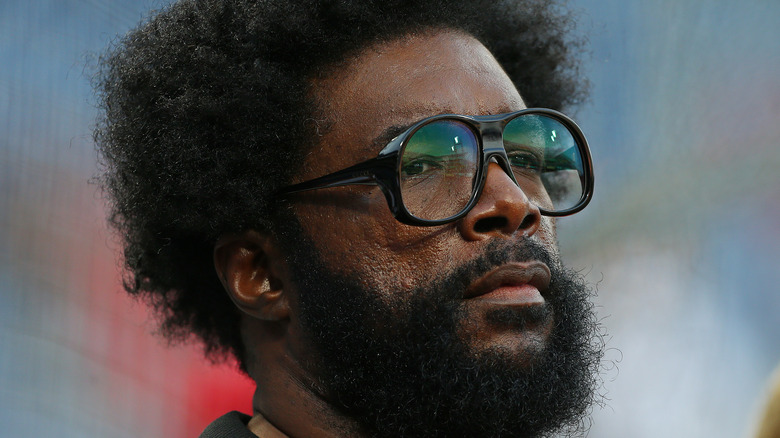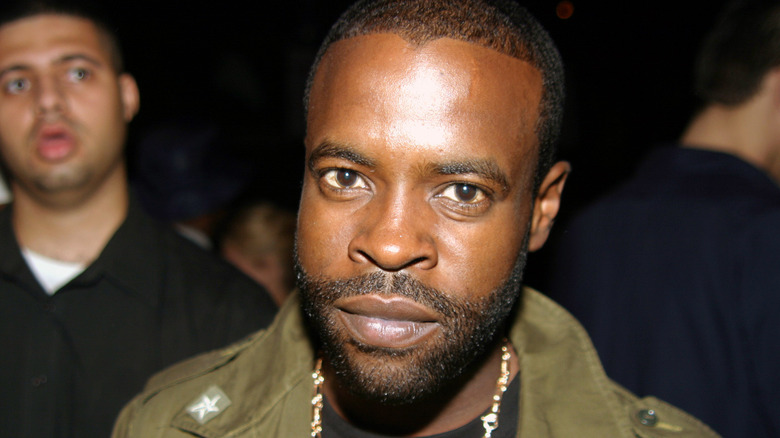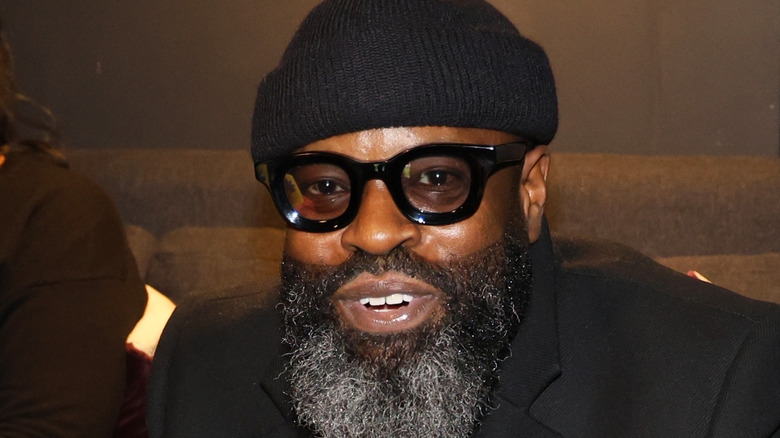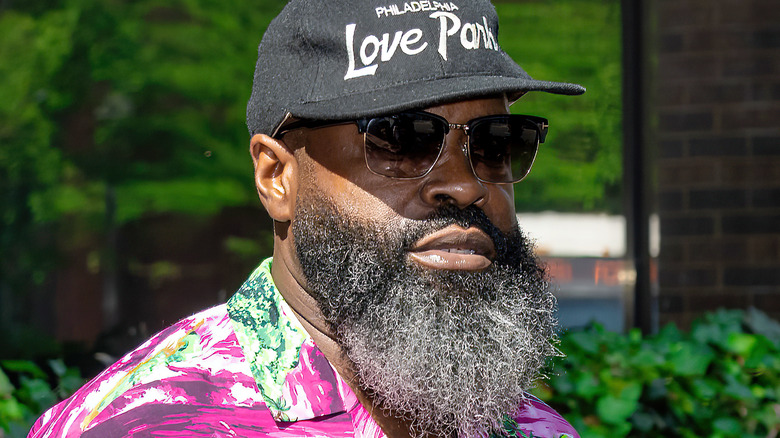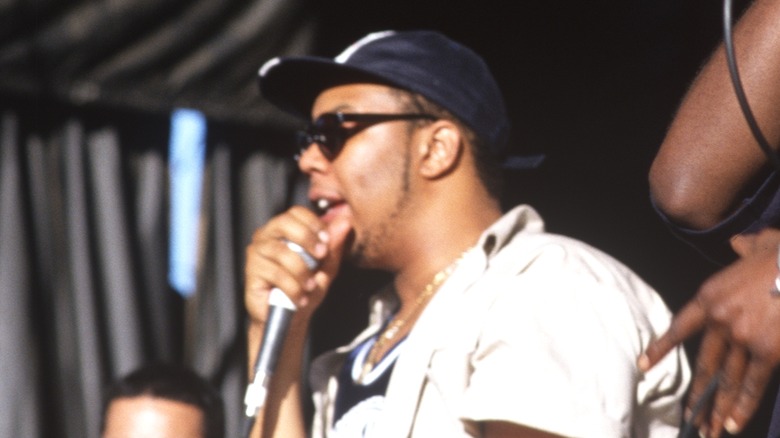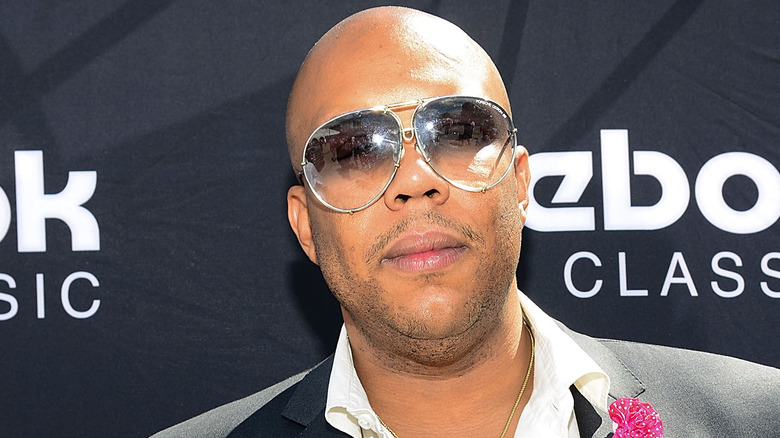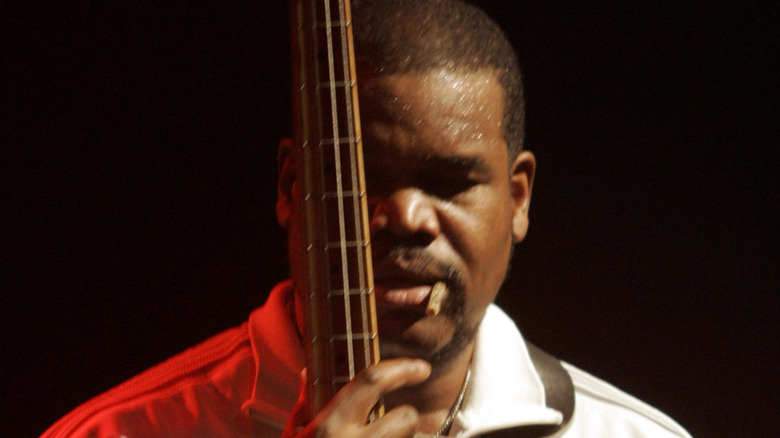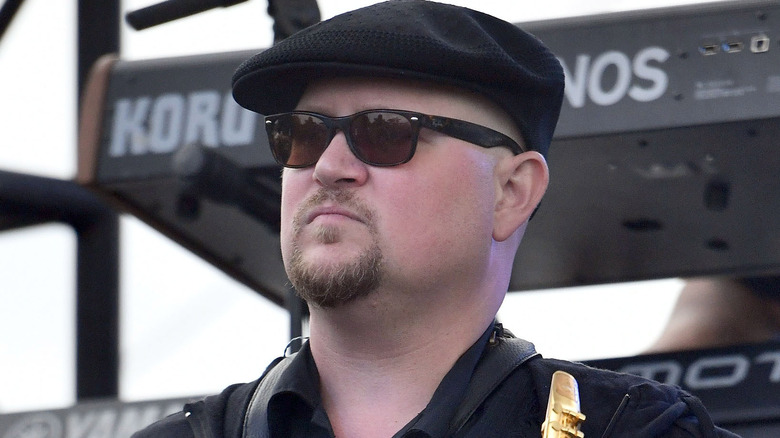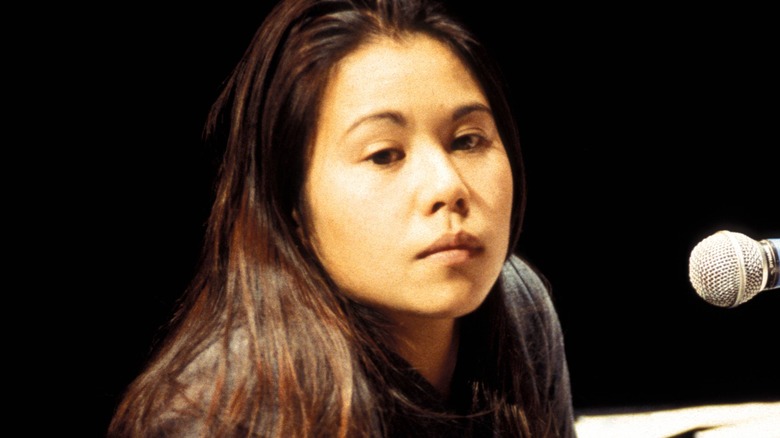Tragic Details About The Roots
A Grammy-winning hip-hop act with live instrumentation that incorporates elements of jazz, classic soul, old-school rap, and rock, the Roots are responsible for some of the most progressive albums of the last few decades while also acting as the house band on "The Tonight Show Starring Jimmy Fallon." They beam their expertly crafted musicianship into millions of homes every night.
A lot of things, positive and negative, coalesced to make this unique and phenomenal musical project. Tough childhoods, numerous personal setbacks, and a deep and abiding love for music made the members of the Roots who they are today. The famous Roots crew out of Philadelphia, Pennsylvania, hasn't had an easy route to fame. Many of its component members, led by founders Questlove (on drums) and Black Thought (the main MC) have lived difficult lives mired in sadness, violence, and flat-out tragedy.
Black Thought burned down his childhood home
As an elementary-school-age child, the Roots' founding vocalist and rapper Black Thought (real name Tariq Trotter) experienced a tragedy of his own accidental doing. "The most profound memory I have from my childhood, is burning down my house at 6 years old," Trotter told The New York Times. "I used to play with green plastic army men, and I would use a lighter to melt parts of their body, to make it seem like they were wounded as they fought each other," he recalled. This time, the lighter grew hotter than usual, Trotter suffered a quick burn, and he instinctively threw the lighter across the room of his family's home in Mount Airy, a neighborhood in Philadelphia. The flame was still active, however, and it made contact with curtains, sending them ablaze. Trotter, his 14-year-old brother, Keith, and their mother's boyfriend all safely got out of the house while firefighters battled the flames.
Much of the home and possessions inside it were lost, but it had left lasting psychological effects on Trotter. "No one ever blamed me. My mother offered enormous grace, knowing that I was just a child," Trotter wrote in his memoir "The Upcycled Self." "But once you've burned down your home, everything else is small in comparison. That experience of total loss became the basis of all that I am."
Black Thought's fire led to extensive family problems
When 6-year-old Tariq Trotter and his family were allowed to return to the remains of their burned home, things seemed even more amiss to Trotter's teenage brother, Keith. "The fire had been extinguished, but my brother had accused a few of the firemen of pocketing some jewelry and smashing some framed family pictures on the floor," Trotter told The New York Times. "My brother also said some of the firemen had destroyed some furniture that had no fire damage at all." Keith didn't hesitate to confront the still-present firefighters, and he accused them of theft and consciously causing property damage. "One of the firemen got in my brother's face and threatened him, and another swung on my brother." Keith engaged in the fight started by the adult firefighter, and as a result, was hauled away by police.
"That day was a turning point not just for me, not just for my family because of the fire, but that was the day my brother was arrested for the first time," Trotter said. "He has been in and out of jail ever since." Six years later, Trotter himself would be arrested for the first time when he was caught leaving graffiti on a basketball court in a Philadelphia park. In high school, he took to selling crack cocaine until an uncle learned what he was up to and sent him to live with relatives in Detroit to get him out of the criminal lifestyle.
Both of Black Thought's parents were murdered
The Roots' rapper Black Thought (Tariq Trotter) never knew his father, who was murdered when the musician was about 1 year old. "What my father was into sent him to his early grave," Tariq freestyled during Harvard's i-lab Other Side Speaker Series. Thomas Trotter was raised in the Germantown neighborhood of Philadelphia, an area that also spawned the Black Brothers group, more commonly known as the Philadelphia Black Mafia. "Years later, I discovered that my dad's body was found near an alley in Germantownn" told The New York Times.
Following his post-Detroit sojourn and return to Philadelphia to complete high school, Tariq learned that his mother had gone missing. A habitual user of crack cocaine who had disappeared before, the rest of Trotter's family feared the worst, and after calling several of Philadelphia's hospitals, police stations, and morgues, they located Cassandra Trotter. "An unidentified black woman matching my mother's description had been admitted to the morgue. Dental records confirmed it was my mother," Tariq said. Police found the murderer, who had stabbed Cassandra to death, and he was sentenced to life in prison. Tariq was only 16 at the time.
Malik B. died young
Drummer Amir Thompson and rapper Tariq Trotter met in the early 1990s while attending Millersville University. In 1993, after adopting the stage names of Questlove and Black Thought, they released the first album "Organix" under the Roots moniker, which prominently featured the vocal work of rapper Malik Abdul-Basit, or Malik B. He'd appear on a few more Roots LPs, including the commercial breakthrough and Grammy-nominated "Things Fall Apart" in 1999, before leaving the group. Lyrics from the track "Water (The First Movement)" off 2002's "Phrenology" hinted at Abdul-Basit's departure due to drug use and sitting out on road dates.
On July 29, 2020, CBS News reporter Don Champion confirmed on X, then known as Twitter, that his cousin, Malik B., had died. In a statement to Rolling Stone, Questlove and Black Thought said, "It is with heavy hearts and tearful eyes that we regretfully inform you of the passing of our beloved brother and long-time Roots member Malik Abdul-Basit." No cause of death was released to the media; Malik B. was 47 years old.
Dice Raw's close friend was murdered
While he was still attending high school in the 1990s, Karl Jenkins, better known as Dice Raw, joined the extended musical universe of the Roots. Contributing hard-edged raps that complement the more diffuse style of Black Thought, Jenkins almost always contributes a guest verse to a song or two on any Roots album, including "Rhymes and Ammo" (from "Phrenology"), "Here I Come" ("Game Theory"), and "Don't See Us"( "Things Fall Apart"). Jenkins maintains an active solo career, where he collaborates with many non-Roots musicians, including Philadelphia rapper James Davis IV, who performed under the name Jimmie Wallstreet.
The afternoon of June 20, 2013, as Davis exited his mother's home in the East Germantown area of Philadelphia, he was shot. Suffering a wound to the groin, Davis was taken to Einstein Medical Center and was pronounced dead less than 40 minutes later. The rapper was 34 years old. Weeks later, Jenkins released the album "Jimmy's Back." The title references Davis. "Jimmy was all about positivity," Dice Raw told Complex. "It's a tragedy that his life had to play out this way. I wanted to dedicate this album to him in the hopes of changing some perspectives and saving some lives."
Hub died, abandoned by his band
Bass player Leonard Hubbard was a fundamental member of the Roots from its early days as a Philadelphia act called the Square Roots, coming aboard after improvising with members at a coffee shop gig in 1992. Known by the nickname/stage name Hub, he subsequently played on every album the group released, up through "Game Theory" in 2006. He departed the group in 2007 for health issues. That's when, as Hubbard's wife, Stephanie, told the Philadelphia Inquirer, the bassist was diagnosed with multiple myeloma, a type of cancer of the blood. After treatment, Hubbard's cancer went into remission for 14 years before an aggressive re-emergence in November 2021. One month later, Hubbard died from the effects of the disease. He was 62 years old.
Hub died with a lawsuit against his former bandmates unsettled. Revived by Stephanie Hubbard in 2023, the filing alleged that the surviving and active members of the Roots cheated Hub out of a fortune potentially worth millions. In the 1990s, the Roots formed multiple corporations to handle its business affairs, recording and publishing deals, and touring revenues. Hub was granted shares in those agreements of 17%, 25%, and 33% respectively. The Hubbards believed that through arrangements with outside corporations, crimes that amounted to racketeering, Hub was systematically denied his share of Roots profits.
Ben Kenney suffered a brain tumor
In 2003, guitarist Ben Kenney switched musical gears, leaving the experimental hip-hop oriented the Roots after a three-year stint — his work can be heard on the 2002 album "Phrenology" — in favor of becoming the new bassist in the alternative rock band Incubus.
A regular member of that group, and others, for more than two decades, Kenney announced on his Instagram page in January 2023 that he would be taking an indefinite break from recording and performing music, as well as social media, citing medical reasons. "Unfortunately last year I found out I had a brain tumor," Kenney said, captioning a photo of himself with a shaved head and prominent surgical stitches surrounding his ear. "As soon as I got home from tour I had a successful operation to have it removed." As of December 2023, Kenney remains away from music in order to properly recover.
A close collaborator of Ian Hendrickson-Smith was murdered
A veteran session musician, sideman, and former member of Sharon Jones and the Dap-Kings, Ian Hendrickson-Smith's saxophone has graced dozens of jazz and pop recordings. Hendrickson-Smith joined the Roots just before the group became the in-studio band on "Late Night with Jimmy Fallon."
Hendrickson-Smith was good friends and collaborators with acclaimed modern jazz drummer Lawrence "Lo" Leathers. In June 2019, that musician was standing in a hall inside of an apartment building in the Mott Haven area of the Bronx in New York City. While arguing with his girlfriend, a third party attacked Leathers, coming up behind him and placing him under a chokehold. Leathers couldn't breathe, quickly passed out, never regained consciousness, and was pronounced dead at the scene. The drummer was 37 years old. A few months later, Hendrickson-Smith and fellow saxophonist Cory Weeds collaborated on the jazz album "The Lowdown," named for Leathers' nickname in tribute. Hendrickson-Smith wrote the dirge-like title track for his murdered friend. Leathers' death "leaves a terrible void in all of us who were lucky enough to know him," Hendrickson-Smith told All About Jazz.
Nikki Yeoh lost her mentor figure
The Roots aren't a traditional band, more of an artistic collective with a frequently changing lineup featuring guests and collaborators. In the early 1990s, British jazz musician Nikki Yeoh performed with the Roots, primarily playing piano and keyboards during its early live shows.
Yeoh's musical development benefited greatly from mentorships. After studying for six years under United Kingdom-based jazz trumpeter Ian Carr, she was spotted playing a London club show by experimental and foundational American jazz singer Betty Carter. "Another very special experience was when Betty Carter was at the club," Yeoh told Jazzwise in 2021, recalling the moment when she got to spontaneously perform with the vocalist. "And straight afterwards she said, 'You must come to New York!' So, I was all set to go to America to learn from her, but sadly she died on the very day I left." Carter had died from pancreatic cancer at the age of 69 on September 26, 1998, denying Yeoh the chance to learn from her predecessor's experience. "For a while I kept thinking 'What if?'" Yeoh lamented, while also acknowledging the tremendous impact the singer had on her.
The descent of Scott Storch
Probably best known as a producer, and the rare celebrity one at that, Scott Storch had a hand in numerous hot singles for major R&B and hip-hop acts in the 2000s. But before Storch crafted hits for Beyoncé, 50 Cent, Mario, the Neptunes, Snoop Dogg, Xzibit, Christina Aguilera, Chris Brown, and Lil Jon, Storch was a member of the Roots. He played keyboards for the hip-hop band throughout the '90s, when he was a teenager.
All that work brought Storch a lot of money. By 2004, he'd earned $70 million, but a few years later, he'd squandered huge portions of it. By the mid-2000s, he was living in a $10.5 million home in a tony Miami neighborhood with multiple sports cars parked outside. Storch failed to pay real estate taxes in 2006 and 2007, and in 2008, he ceased making child support payments, leading to lawsuits from the mothers of those offspring. To make matters worse, the production gigs dried up, too. Storch would later blame most of his problems on a serious cocaine addiction. After three years of trying to give up the drug, he found a rehabilitation program that worked, and he attained sobriety. "We all think we're not going to get to that point," Storch told MTV News. "It sneaks up on you real fast. You don't think it's affecting you, but it does."
